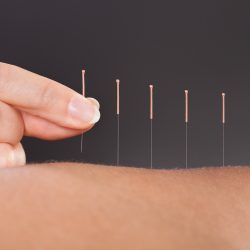
Polycystic Ovary Syndrome in Leigh on Sea Essex at Eco Therapies with qualified Acupuncturist Elaine Otrofanowei
What is Polycystic Ovary Syndrome?
Polycystic ovary syndrome (PCOS) is a complex hormonal condition,in women, affecting many aspects of their health, particularly the reproductive system.
It may present with a menu of symptoms including:
- Polycystic ovaries(surface of ovaries covered in many follicles)
- Irregular or absent periods
- infertility
- Recurrent miscarriage
- Acne
- Hair loss
- Weight gain
- Excess body hair
- Skin tags
- Acanthosis Nigrican
- Diabetes
- Hypertension
- Fatigue
- Mood swings
The symptoms can be mild or severe and vary from women to woman.
These symptoms are due to abnormalities in some of the hormones
that control a women’s menstrual cycle. To understand how
these imbalances affect this cycle lets see what happens in a ‘normal’ cycle.
Elaine uses Acupuncture
natural therapy for the relief of symptoms of hormonal imbalance
such as Polycystic Ovary Syndrome.
The Normal Menstrual Cycle
In a normal menstrual cycle, the first half, called the follicular
phase, starts on the first day of a period and lasts for
about 14 days, in this phase the
pituitary gland in the brain, releases the hormone, follicle stimulating
hormone (FSH). This stimulates the follicles(tiny cyst containing
immature eggs) in
the ovary to grow. As the eggs mature they produce another hormone oestrogen, which
causes the lining of the womb to start to thicken in preparation
for pregnancy. When
the levels of oestrogen are high enough the pituitary gland release Luteinzing
hormone (LH) and the dominant matured follicle in the ovary releases its
egg in to the fallopian tubes in a process called Ovulation.
After ovulation the Luteal phase starts, here the cells from
the ruptured follicle form a cyst, called Corpus Luteum.
This produces the hormone Progesterone,
which
cause the thickened lining of the womb to secrete nutrients ready for the
fertilised egg. If the egg is fertilized it will implant and the corpus
luteum will continue
to produce progesterone to support the pregnancy. If it is not fertilized
the corpus luteum stops producing progesterone. Progesterone and oestrogen
levels
fall and the lining of womb breaks down and is shed as a period.
What happens in PCOS?
In PCOS there is an imbalance with the hormones that mature the follicles FSH and the hormone that triggers
ovulation, LH, which means that periods are irregular or
absent, which makes it difficult to become pregnant. Also
because there
is no ovulation there is not an increase in progesterone
to balance the hormone oestrogen in the second half of the
cycle
and you get symptoms such as fatigue, hot flushes, mood swings,
depression and no periods.
Because the body’s hormones system is interconnected, an
imbalance in one hormone can affect the balance of others. PCOS
affects the hormone Insulin, which is produced by the pancreas
to regulate the levels of glucose in the blood. Many women can
become insulin resistant, this means the body produce more insulin to push the glucose into the cells. Insulin also encourages the body to store sugar as fat.
This causes weight gain, difficulty in losing weight and often
development of type 2 diabetes.
The high levels of insulin signals the ovaries to secrete testosterone and inhibit hepatic sex-hormone binding globulin (SHBG) production which leads to an increased level of circulating testosterone. This is why many women with PCOS experience acne, facial hair growth and male pattern baldness (hirsutism). Excess insulin in the bloodstream also signals the ovaries to release more estrogen which can suppress ovulation.
PCOS women also suffer with low grade inflammation .
What causes PCOS?
Doctors do not yet fully understand what cause these hormonal
abnormalities. It is thought that there is a hereditary
link, whereby some women inherit a greater chance of
having PCOS,
but whether or not these women develop PCOS depends on
a number of
additional factors such as diet and lifestyle.
How is PCOS diagnosed?
The diagnosis is based on a patient’s symptoms and physical
appearance and confirmed by ultrasound scan of the ovaries and
blood test to check the levels of different hormones, these would
include:
Pituitary and Ovarian Hormone serum levels:
- Luteinizing Hormone (LH)
- Follicle Stimulating Hormone (FSH)
- Estradiol
- Progesterone
- Prolactin
Circulating Androgens:
- Free testosterone
- Free androgen index (FAI): 17-hydroxyprogesterone
- Sex hormone binding globulin (SHBG): 24 hr. urinary free cortisol
- Dehydroepiandrosterone sulfate (DHEA-S)
- Some practitioners may include the following tests:
Glucose Tolerance Test
Thyroid Panel
Blood Lipid Profile
To be diagnosed with PCOS you will have to met 2 out of 3 criteria, known as the Rotterdam Criteria:
- Delayed ovulation or menstrual cycles (anovulation)
- Hyperandrogenism ( high androgenic hormone like testosterone/ signs of)
- Polycystic ovaries on ultra sound
Conventional Treatment
This will depend on if the patient is trying to become pregnant:
- The contraceptive pill, Dianette, to help regulate periods
- Metformin to help with weight loss
- Clomiphene If the patient is trying to conceive, this drug
stimulates ovulation. - Gonadotrophin injections- direct stimulation of the ovarian
follicles. - Finasteride – to help reduce abnormal hair growth.
- Surgery – ovarian diathermy, part of the ovary is
burned away to correct the hormonal imbalance.
Complementary Therapies
Conventional treatments alone may have side effects and more
over does not deal with root cause of the problem and when the
drugs are withdrawn these symptoms recur.
I have found that the combination of Acupuncture , nutritional advice, supplements, herbs and exercise, may help to re-establish menstrual cycles.
These may help to:
- Balance the hormones
- Reduce congestion in the reproductive organs
- Reduce the symptoms associated with stress
More Information
For more information about hormonal imbalance such as Polycystic
Ovary Syndrome, see the PCOS support group website – www.verity-pcos.org.uk